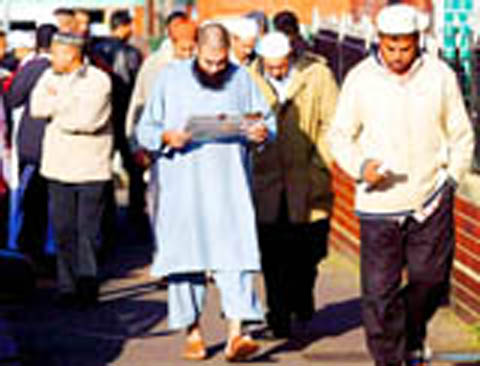A major medical row will erupt this month when scientists and health experts hold two key meetings to discuss the controversial subject of marriages between cousins and their impact on health in the UK.
The debates will be held by the Royal Society of Medicine as part of its 100 Years of Medical Genetics celebrations on May 23, and by the Progress Educational Trust at Clifford Chance in east London on May 29. Both will reveal deep divisions among scientists.
Some researchers and politicians say inter-cousin unions, which are highly prevalent among British Pakistanis, have led to a striking rise in the incidence of rare recessive disorders, many of them fatal, in areas such as Bradford. The trend has led to calls for cousin marriages to be banned.

PHOTO: EPA
“In our local school for deaf children, half the pupils are of Asian origin though Asians only form about 20 percent of the population,” said Ann Cryer, MP for Keighley, West Yorkshire. “I also know of several sets of parents in my constituency who are cousins and whose children are severely disabled. I have no doubt that the mothers and fathers being closely related to each is a key factor.
“We give warnings about the dangers of smoking, drinking and taking drugs. It is now time that Primary Care Trusts started doing the same for cousin marriages.”
Others who have warned about the dangers include Phil Woolas, an environment minister, who provoked fury earlier this year when he said the culture of arranged marriages between first cousins was the “elephant in the room” and argued that if “you have a child with your cousin, the likelihood is there will be a genetic problem.”
This last claim is hotly disputed by genetic counselors and Muslim doctors. They point out that the danger of a child having birth defects if the parents are cousins is double that of other children, which means the risk rises from about 2 percent in the general population to about 4 percent when the parents are closely related. A risk of 4 percent therefore does not make it “likely” there will a genetic problem, as Woolas claimed, say genetic counselors.
“The danger posed by cousin marriage is highly exaggerated,” said Aamra Darr, a senior research fellow at Bradford University. As Darr pointed out, women in the UK are more likely now to have children when they are over 30, increasing the likelihood of them having babies with Down’s Syndrome. But no one suggests that there should be a ban on over-30s having babies, Darr added. Medicine has adapted to improve screening services for these women.
“We should recognize that for British Pakistanis, cousin marriages represent significant cultural advantages. Recent advances mean we can pinpoint many of those at risk of having affected babies. That is where we should be placing our efforts.”
Meanwhile, as geneticist Alan Bittles of Murdoch University, Perth, has pointed out, a large majority of children born to first cousins are healthy: “Many famous figures married their first cousin, including Charles Darwin and Albert Einstein.”

May 18 to May 24 Pastor Yang Hsu’s (楊煦) congregation was shocked upon seeing the land he chose to build his orphanage. It was surrounded by mountains on three sides, and the only way to access it was to cross a river by foot. The soil was poor due to runoff, and large rocks strewn across the plot prevented much from growing. In addition, there was no running water or electricity. But it was all Yang could afford. He and his Indigenous Atayal wife Lin Feng-ying (林鳳英) had already been caring for 24 orphans in their home, and they were in

President William Lai (賴清德) yesterday delivered an address marking the first anniversary of his presidency. In the speech, Lai affirmed Taiwan’s global role in technology, trade and security. He announced economic and national security initiatives, and emphasized democratic values and cross-party cooperation. The following is the full text of his speech: Yesterday, outside of Beida Elementary School in New Taipei City’s Sanxia District (三峽), there was a major traffic accident that, sadly, claimed several lives and resulted in multiple injuries. The Executive Yuan immediately formed a task force, and last night I personally visited the victims in hospital. Central government agencies and the

Australia’s ABC last week published a piece on the recall campaign. The article emphasized the divisions in Taiwanese society and blamed the recall for worsening them. It quotes a supporter of the Taiwan People’s Party (TPP) as saying “I’m 43 years old, born and raised here, and I’ve never seen the country this divided in my entire life.” Apparently, as an adult, she slept through the post-election violence in 2000 and 2004 by the Chinese Nationalist Party (KMT), the veiled coup threats by the military when Chen Shui-bian (陳水扁) became president, the 2006 Red Shirt protests against him ginned up by

As with most of northern Thailand’s Chinese Nationalist Party (KMT) settlements, the village of Arunothai was only given a Thai name once the Thai government began in the 1970s to assert control over the border region and initiate a decades-long process of political integration. The village’s original name, bestowed by its Yunnanese founders when they first settled the valley in the late 1960s, was a Chinese name, Dagudi (大谷地), which literally translates as “a place for threshing rice.” At that time, these village founders did not know how permanent their settlement would be. Most of Arunothai’s first generation were soldiers